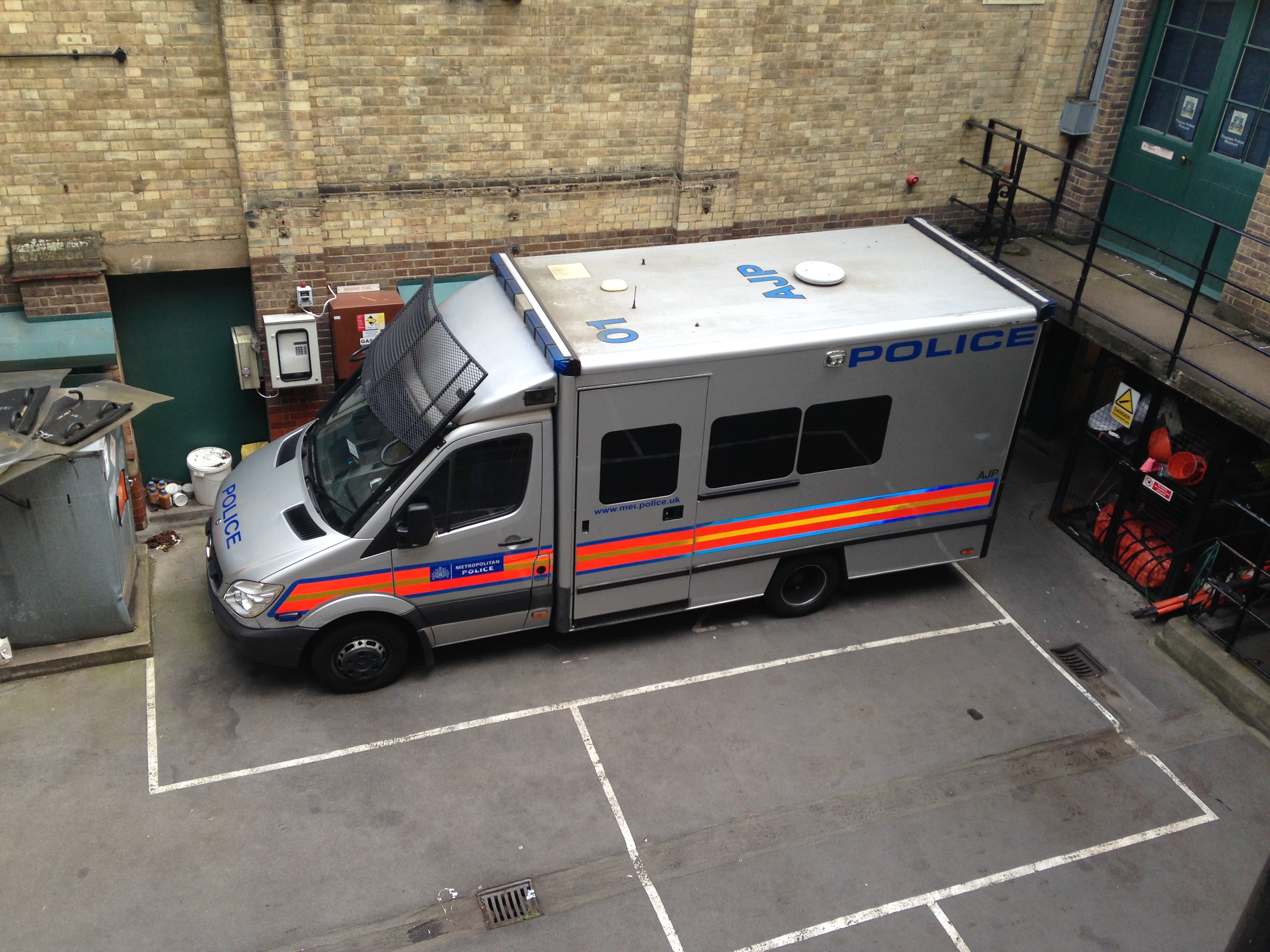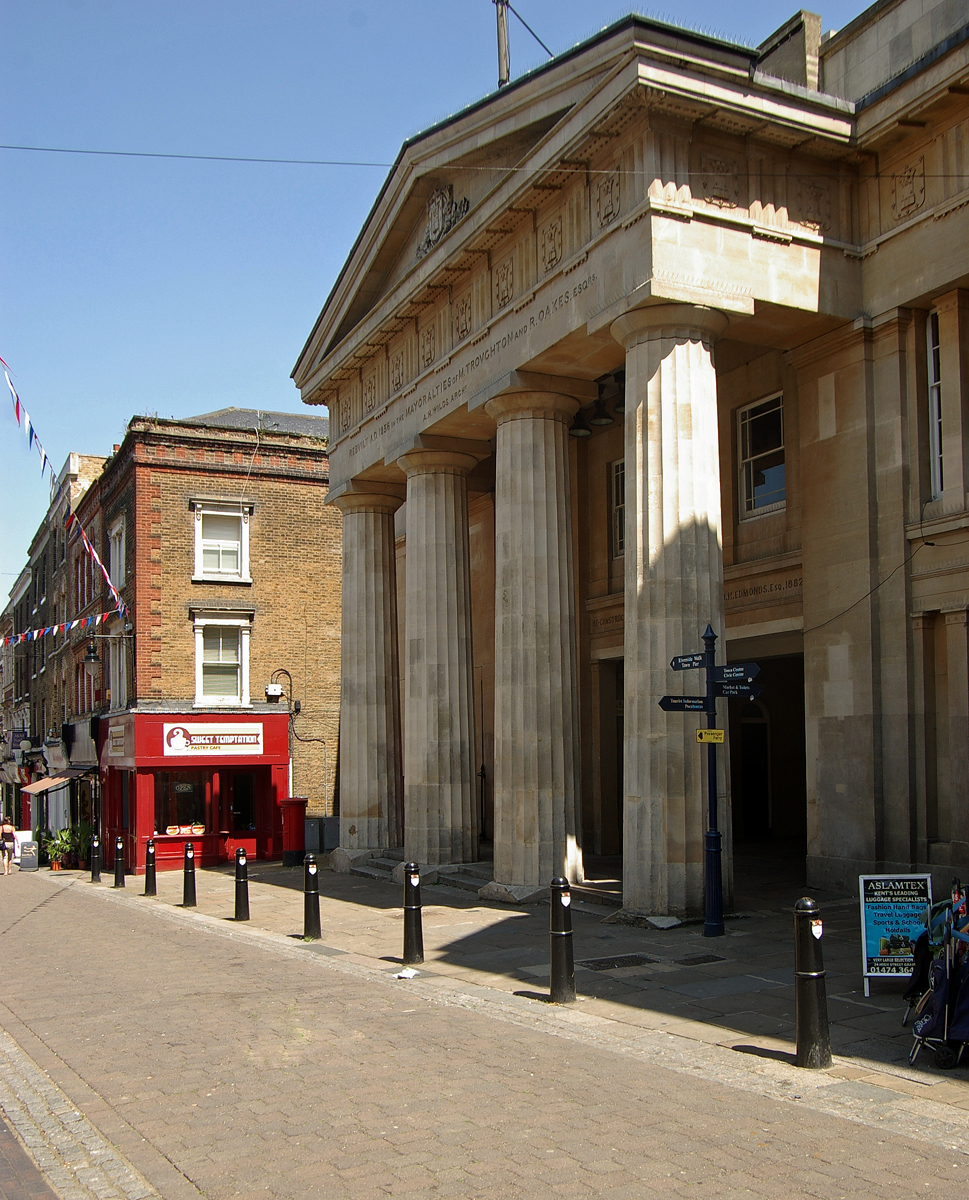|
Territorial Support Group
The Territorial Support Group (TSG) is a Met Operations unit of London's Metropolitan Police Service (MPS) which specialises in public order policing, amongst other specialist areas. In 2012 it consisted of 793 officers and 29 support staff. The TSG is a uniformed unit of the MPS that replaced the similarly constituted Special Patrol Group in 1987. TSG units patrol the streets of London in marked police vans or "carriers"; using the call sign prefix "Uniform". Generally each carrier has an advanced (police) driver, seven constables and a sergeant. Territorial Support Groups often comprise three carriers, twenty one constables, and three sergeants reporting to an Inspector. They separately patrol designated areas experiencing serious levels of gang violence or disorder. When deployed, it is by the MPS Information Room. Due to the public order nature of their role often numerous carriers will be assigned. TSG officers can be identified as TSG from the distinctive "U" in their sh ... [...More Info...] [...Related Items...] OR: [Wikipedia] [Google] [Baidu] |
Specialist Crime & Operations
Met Operations, also known as Met Ops, is one of the four business groups which forms the Metropolitan Police Service and is responsible for providing operational support services.. It was created during the 2018-19 restructuring of the service, amalgamating many of its functions from the Operations side of the Specialist Crime & Operations Directorate formed in 2012, with the Specialist Crime side of that Directorate placed under the new Frontline Policing Directorate. The group is currently led by Temporary Assistant Commissioner Matt Twist. It consists of several branches: *Met Ops Chief Officer Team ''(MO1)'' *Met Intelligence ''(MO2)'' *Covert Policing ''(MO3)'' *Forensic Services ''(MO4)'' *Covert Governance ''(MO5)'' *Public Order Planning ''(MO6)'' *Taskforce ''(MO7)'' **Territorial Support Group **Marine Policing Unit ** Dog Support Unit **Mounted Branch *Roads and Transport Policing Command ''(MO8)'' *Met Detention ''(MO9)'' *Met Prosecutions ''(MO10)'' *Operational Sup ... [...More Info...] [...Related Items...] OR: [Wikipedia] [Google] [Baidu] |
Police Support Unit (United Kingdom)
A Police Support Unit or PSU is a unit of police officers who have undergone specialist tactical training in Public Order and Riot Control. About Police Support Unit training in the United Kingdom is voluntary tactical training undertaken by selected candidates that provides students with the skills required to safely and effectively deal with a variety of public order situations outside the remit or capability of regular divisional officers. Comparable units in the United States are local SWAT teams, trained to deal with situations beyond normal police work. PSU-trained officers in the UK are commonly referred to as Level 2, Mutual Aid Support Trained, or PSU officers. Equipment The majority of UK Police Forces use Mercedes-Benz Sprinter vans, commonly referred to as 'Carriers', as standard transport for PSUs. A notable exception is the Police Service of Northern Ireland, whose Tactical Support Group officers famously use armoured Land Rovers. These vehicles are equipped with me ... [...More Info...] [...Related Items...] OR: [Wikipedia] [Google] [Baidu] |
CBRN
Chemical, biological, radiological and nuclear defence (CBRN defence) are protective measures taken in situations in which chemical, biological, radiological or nuclear warfare (including terrorism) hazards may be present. CBRN defence consists of CBRN passive protection, contamination avoidance, and weapons of mass destruction mitigation. A CBRN incident differs from a hazardous material incident in both scope (i.e., CBRN can be a mass casualty situation) and intent. CBRN incidents are responded to under the assumption that they are intentional and malicious; evidence preservation and perpetrator apprehension are of greater concern than with HAZMAT incidents. A 2011 forecast concluded that worldwide government spending on CBRN defence products and services would reach US$8.38bn that year. Etymology In English the term ''CBRN'' is a replacement for the 1960s–1980s term ''NBC'' (nuclear, biological, and chemical), which had replaced the term ''ABC'' (atomic, biological, ... [...More Info...] [...Related Items...] OR: [Wikipedia] [Google] [Baidu] |
Public Protest
A protest (also called a demonstration, remonstration or remonstrance) is a public expression of objection, disapproval or dissent towards an idea or action, typically a political one. Protests can be thought of as acts of cooperation in which numerous people cooperate by attending, and share the potential costs and risks of doing so. Protests can take many different forms, from individual statements to mass demonstrations. Protesters may organize a protest as a way of publicly making their opinions heard in an attempt to influence public opinion or government policy, or they may undertake direct action in an attempt to enact desired changes themselves. Where protests are part of a systematic and peaceful nonviolent campaign to achieve a particular objective, and involve the use of pressure as well as persuasion, they go beyond mere protest and may be better described as a type of protest called civil resistance or nonviolent resistance. Various forms of self- ... [...More Info...] [...Related Items...] OR: [Wikipedia] [Google] [Baidu] |
2012 Summer Olympics
The 2012 Summer Olympics (officially the Games of the XXX Olympiad and also known as London 2012) was an international multi-sport event held from 27 July to 12 August 2012 in London, England, United Kingdom. The first event, the group stage in women's football, began on 25 July at the Millennium Stadium in Cardiff, followed by the opening ceremony on 27 July. 10,768 athletes from 204 National Olympic Committees (NOCs) participated in the 2012 Olympics. Following a bid headed by former Olympic champion Sebastian Coe and the then-London mayor Ken Livingstone, London was selected as the host city at the 117th IOC Session in Singapore on 6 July 2005, defeating bids from Moscow, New York City, Madrid, and Paris. London became the first city to host the modern Olympics three times, having previously hosted the Summer Games in 1908 and 1948. Construction for the Games involved considerable redevelopment, with an emphasis on sustainability. Th ... [...More Info...] [...Related Items...] OR: [Wikipedia] [Google] [Baidu] |
Military
A military, also known collectively as armed forces, is a heavily armed, highly organized force primarily intended for warfare. It is typically authorized and maintained by a sovereign state, with its members identifiable by their distinct military uniform. It may consist of one or more military branches such as an army, navy, air force, space force, marines, or coast guard. The main task of the military is usually defined as defence of the state and its interests against external armed threats. In broad usage, the terms ''armed forces'' and ''military'' are often treated as synonymous, although in technical usage a distinction is sometimes made in which a country's armed forces may include both its military and other paramilitary forces. There are various forms of irregular military forces, not belonging to a recognized state; though they share many attributes with regular military forces, they are less often referred to as simply ''military''. A nation's militar ... [...More Info...] [...Related Items...] OR: [Wikipedia] [Google] [Baidu] |
Stadium
A stadium ( : stadiums or stadia) is a place or venue for (mostly) outdoor sports, concerts, or other events and consists of a field or stage either partly or completely surrounded by a tiered structure designed to allow spectators to stand or sit and view the event. Pausanias noted that for about half a century the only event at the ancient Greek Olympic festival was the race that comprised one length of the stadion at Olympia, where the word "stadium" originated. Most of the stadiums with a capacity of at least 10,000 are used for association football. Other popular stadium sports include gridiron football, baseball, cricket, the various codes of rugby, field lacrosse, bandy, and bullfighting. Many large sports venues are also used for concerts. Etymology "Stadium" is the Latin form of the Greek word " stadion" (''στάδιον''), a measure of length equalling the length of 600 human feet. As feet are of variable length the exact length of a stadion depends on the ... [...More Info...] [...Related Items...] OR: [Wikipedia] [Google] [Baidu] |
Association Football
Association football, more commonly known as football or soccer, is a team sport played between two teams of 11 players who primarily use their feet to propel the ball around a rectangular field called a pitch. The objective of the game is to score more goals than the opposition by moving the ball beyond the goal line into a rectangular framed goal defended by the opposing side. Traditionally, the game has been played over two 45 minute halves, for a total match time of 90 minutes. With an estimated 250 million players active in over 200 countries, it is considered the world's most popular sport. The game of association football is played in accordance with the Laws of the Game, a set of rules that has been in effect since 1863 with the International Football Association Board (IFAB) maintaining them since 1886. The game is played with a football that is in circumference. The two teams compete to get the ball into the other team's goal (between the posts and under ... [...More Info...] [...Related Items...] OR: [Wikipedia] [Google] [Baidu] |
Gravesend, Kent
Gravesend is a town in northwest Kent, England, situated 21 miles (35 km) east-southeast of Charing Cross (central London) on the south bank of the River Thames and opposite Tilbury in Essex. Located in the diocese of Rochester, it is the administrative centre of the Borough of Gravesham. Its geographical situation has given Gravesend strategic importance throughout the maritime and communications history of South East England. A Thames Gateway commuter town, it retains strong links with the River Thames, not least through the Port of London Authority Pilot Station and has witnessed rejuvenation since the advent of High Speed 1 rail services via Gravesend railway station. The station was recently refurbished and now has a new bridge. Toponymy Recorded as Gravesham in the Domesday Book of 1086 when it belonged to Odo, Earl of Kent and Bishop of Bayeux, the half-brother of William the Conqueror, its name probably derives from ''graaf-ham'': the home of the reeve or ... [...More Info...] [...Related Items...] OR: [Wikipedia] [Google] [Baidu] |
Metropolitan Police Specialist Training Centre
The Metropolitan Police Specialist Training Centre is a specialist training centre for the Metropolitan Police in Gravesend, Kent. It provides both Public Disorder and Specialist Firearms training to officers drawn from the MPS, British Transport Police , nativename = , abbreviation = BTP , patch = , patchcaption = , logo = British Transport Police Logo.svg , logocaption = Logo of the British Transport Police , badge = , badgecaption = , f ... and City of London Police. The centre was purpose-built for the Metropolitan Police and opened in 2003. The site The site covers 9,250 square metres and was rebuilt by Equion.It was a former military firing range and also the National Civilian Seacraft training centre before the centre relocated to the local college campus. It features mock roads, shops, a pub, a bank, a nightclub, a football stadium, train and underground stations with full-size carriages and a full-size sectio ... [...More Info...] [...Related Items...] OR: [Wikipedia] [Google] [Baidu] |
Riot
A riot is a form of civil disorder commonly characterized by a group lashing out in a violent public disturbance against authority, property, or people. Riots typically involve destruction of property, public or private. The property targeted varies depending on the riot and the inclinations of those involved. Targets can include shops, cars, restaurants, state-owned institutions, and religious buildings. Riots often occur in reaction to a grievance or out of dissent. Historically, riots have occurred due to poverty, unemployment, poor living conditions, governmental oppression, taxation or conscription, conflicts between ethnic groups ( race riot) or religions ( sectarian violence, pogrom), the outcome of a sporting event ( sports riot, football hooliganism) or frustration with legal channels through which to air grievances. While individuals may attempt to lead or control a riot, riots typically consist of disorganized groups that are frequently "chaotic and exhibit ... [...More Info...] [...Related Items...] OR: [Wikipedia] [Google] [Baidu] |







